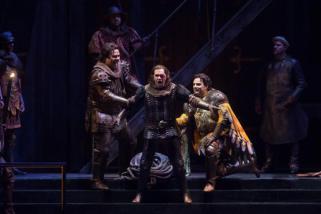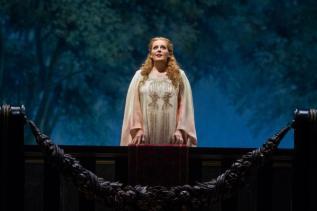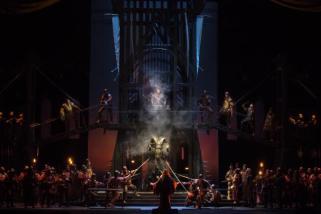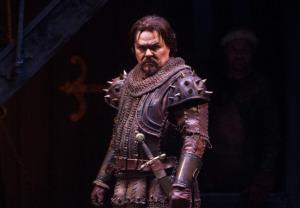
Mark Delavan, Robert Brubaker, Marcello Giordani in Act II of Francesca da Rimini (minnesota.publicradio.org)
What a strange and fascinating work Riccardo Zandonai’s Francesca da Rimini is! It’s neither postmodern nor late-romantic in style or content; it’s not even what most scholars would label verismo, although there are plenty of hints in that direction.
So what is it? Well, it could be a melodrama disguised as grand opera, the kind that Tito Ricordi, son of Giulio Ricordi (one of the founders of the great publishing firm that bears his family’s name), begged, cajoled and pleaded with Giacomo Puccini to put on the Italian stage. Puccini would have none of it, whereby Tito turned to the up-and-coming Zandonai to do the dirty work. Together, they adapted playwright Gabriele D’Annunzio’s convoluted drama of the same name as the basis for this four-act opera.
Truth be told, it’s not Verdi — nor even warmed over Puccini — yet there’s enough leftover strands of Wagner throughout to make one sit up and take notice, with a smidgen or two of Strauss added in, a bit of Debussy, and maybe – just maybe – a slight dose of Mascagni for seasoning, along with the darkest portions of Leoncavallo’s Pagliacci tossed into the fray. All in all, this is an exotic Caesar salad bowl flavored with spicy Italian window dressing. But is it original? Yes and no. It does have its own peculiar sound-scape, but is that reason enough to produce it? Good question!
It fluctuates wildly in terms of both music and drama, with Acts I and III sounding like carbon copies of each other, and Act II the most action-packed of the four. Act IV is divided into two scenes, the most gripping of which, Scene i, a veritable chamber of horrors that features blood-curdling screams (hats off to tenor Dustin Lucas as the Prisoner in the dungeon), torture, duplicity, decapitation and general mayhem. Scene ii reverts to the love-making formula of the first and third acts, and so on. A most curious piece, I must say, but in the right hands it can raise the temperature level of any opera house.
The work premiered in Turin in 1914, while the Met took the opera up in 1916 and gave it a total of eleven performances. Since then, Francesca lay dormant for 68 seasons before awakening (like Sleeping Beauty?) to the Met’s lavish 1984 Piero Faggioni production under maestro James Levine, with Renata Scotto as Francesca, Placido Domingo as Paolo il Bello (“The Handsome One”), veteran Cornell MacNeil as Gianciotto (“The Lame One”), and William Lewis as Malatestino (“The One-Eyed”). Itself based on a section of Dante’s Inferno, the opera can be summed up as too much, and not enough, of a good thing.
Domingo had his first encounter with the handsome Paolo in a concert performance back in the early seventies, preserved on a “private label” recording from 1973 with the Opera Orchestra of New York under the baton of Eve Queler, and featuring Romanian soprano Raina Kabaivanska as Francesca and Matteo Manuguerra as Gianciotto. There’s also a Decca/London highlights disc from 1969 of Great Scenes from Francesca da Rimini, which paired legendary diva Magda Olivero (a true verismo specialist) with an over-the-hill Mario Del Monaco as the two lovers. In the Met’s most recent revival, which aired on March 16, the title role was taken by Dutch soprano Eva-Maria Westbroek, Marcello Giordani was Paolo, Mark Delavan was Gianciotto, and Robert Brubaker the Malatstino. The opera was conducted by Marco Armiliato.
To begin with, the Met should never have considered reviving this period piece without a stellar female vocalist to lead the way. Trying to follow in Madame Scotto’s footsteps – or, for that matter, Olivero’s and Kabaivanska’s before her – is a gesture in futility at best. Unless, of course, you happen to be the best that money can buy. In which case, I would think that a revival would be in order. Not here, I dare say.

Eva-Maria Westbroek as Francesca (minnesota.publicradio.org)
Ms. Westbroek is best known for her Anna Nicole Smith in Mark-Anthony Turnage’s pop opera Anna Nicole of a few years back, to be given next season at New York City Opera. Come to think about it, there’s not that much difference between the two characters of Francesca and Anna Nicole. Both take on lovers (numerous ones, in Anna Nicole’s case), and both die tragically at the end, although Anna Nicole perished at her own hands, while Francesca was slain by her jealous husband Gianciotto for fiddling around with the best looking of the three brothers, Paolo. Anna Nicole, as the opera and the E! Hollywood Network would have us believe, was the victim of her own excesses. Westbroek certainly brought that out in her Francesca. She talked a good game about the role as well, in her on-air interview and in the print media, but the execution left much to be desired. Without that flash of prima donna fireworks spewing forth, this adulteress was dull, dull, dull…
Westbroek did far better as Sieglinde in last year’s Die Walküre– but then again, her partner in crime was the tenor of the moment, Jonas Kaufmann, whose matinée idol looks and golden throatiness could melt the heart of Pharaoh. Not so with current co-star Marcello Giordani, who (I’m told) looked decades older than his leading lady, which put the lid on credibility for the duration of the work. A mismatched pair of doomed lovers does not an expensive revival make. Let that be a lesson, Met management. Next time, make the casting for this (or any other work from this period) a number one priority.
Getting back to Giordani, the tenor was up to his old tricks of straying off pitch, singing as sharp as ever. To be fair, he did manage to express a sufficient amount of passion when called for. My gut feeling, though, was that Marcello was ten years too late in performing this part. I missed Domingo’s ardent vocals and caressing line, that ability of his to toss off searing emotional outbursts with burnished tone and rock-steady musicianship. This is why I criticized Domingo’s assumption of the baritone repertory so harshly. His natural Fach has been, and will always be, as a tenor. Why blow it now?
Emerging unscathed from the torpor was the dynamic duo of baritone Mark Delavan and tenor Robert Brubaker as the evil brothers, Gianciotto and Malatestino. This was Delavan’s initial take on the brutal warlord with the monstrously jealous nature, while Brubaker (a notable Met Mime in Siegfried) shined as the pathologically disturbed third sibling, who’s called “The One-Eyed One” (and for good reason: he loses his eye in battle during the Act II melee).

Battering ram scene from Act II of Francesca da Rimini (minnesota.publicradio.org)
Whenever these two artists were on stage together, the place lit up like a Christmas tree with their ranting and raving. Neither singer could eclipse memories of the mighty warrior envisioned by the late Cornell MacNeil, a true devil-incarnate Gianciotto, back in 1984. MacNeil’s grand Act II entrance was the highlight of the evening: as he popped his head out of the trapdoor he gave off one of his signature high notes that literally filled the vast Met auditorium. Delavan may not have approached the “Big Mac” in the goose-bump department, but he gave it all he got. Too bad his upper tones wavered somewhat, and he strayed perilously off pitch at key moments. I thought Brubaker was a shade better than William Lewis, who enacted his role better than he sang it. Not so with Brubaker, who chilled the bones in his two scenes.
Maybe it was the distasteful subject matter or maybe it was the lack of truly great voices in the grand opera manner – make that, Grand Guignol manner instead. For really, that’s what Francesca da Rimini turned out to be: a Sweeney Todd-style programmer without the barber’s chair. All that’s left was the blood, with plenty of guts and precious little else to show for it. Not even maestro Armiliato could help matters any, but he did try his best with what he had. Still, you can’t make a silk purse out of a sow’s ear.

Mark Delavan as Gianciotto (minnesota.publicradio.org)
It’s debatable what constitutes “greatness” in this day and age. Of the above cast members, surely Delavan has the makings of greatness, a potential heavyweight in the bass-baritone division. The Italian roles he’s taken on so far (i.e., Gérard in Andrea Chénier, Don Carlo in La Forza del Destino, Scarpia in Tosca) need work, but he’s got the basic raw goods in his blood. The voice is a combination of George London’s fullness with Leonard Warren’s steel and solidity. A leonine talent whose volume is not as large as his predecessors, Delavan will soon be heard to better advantage in the German repertoire, particularly with his forthcoming assignment as Wotan in Wagner’s Ring-cycle operas. I look forward to reviewing him in my next two posts. Stay tuned!
Copyright © 2013 by Josmar F. Lopes

